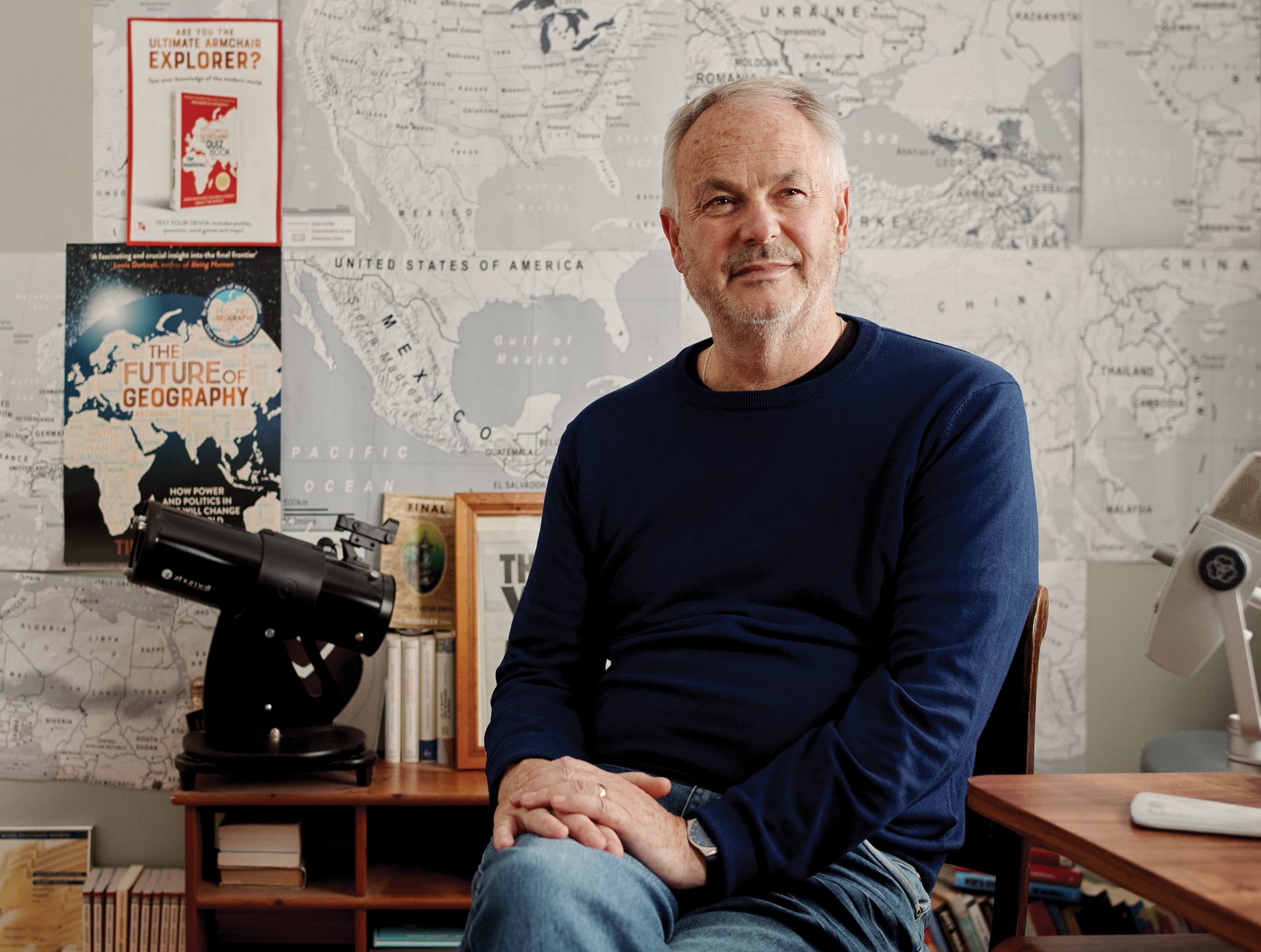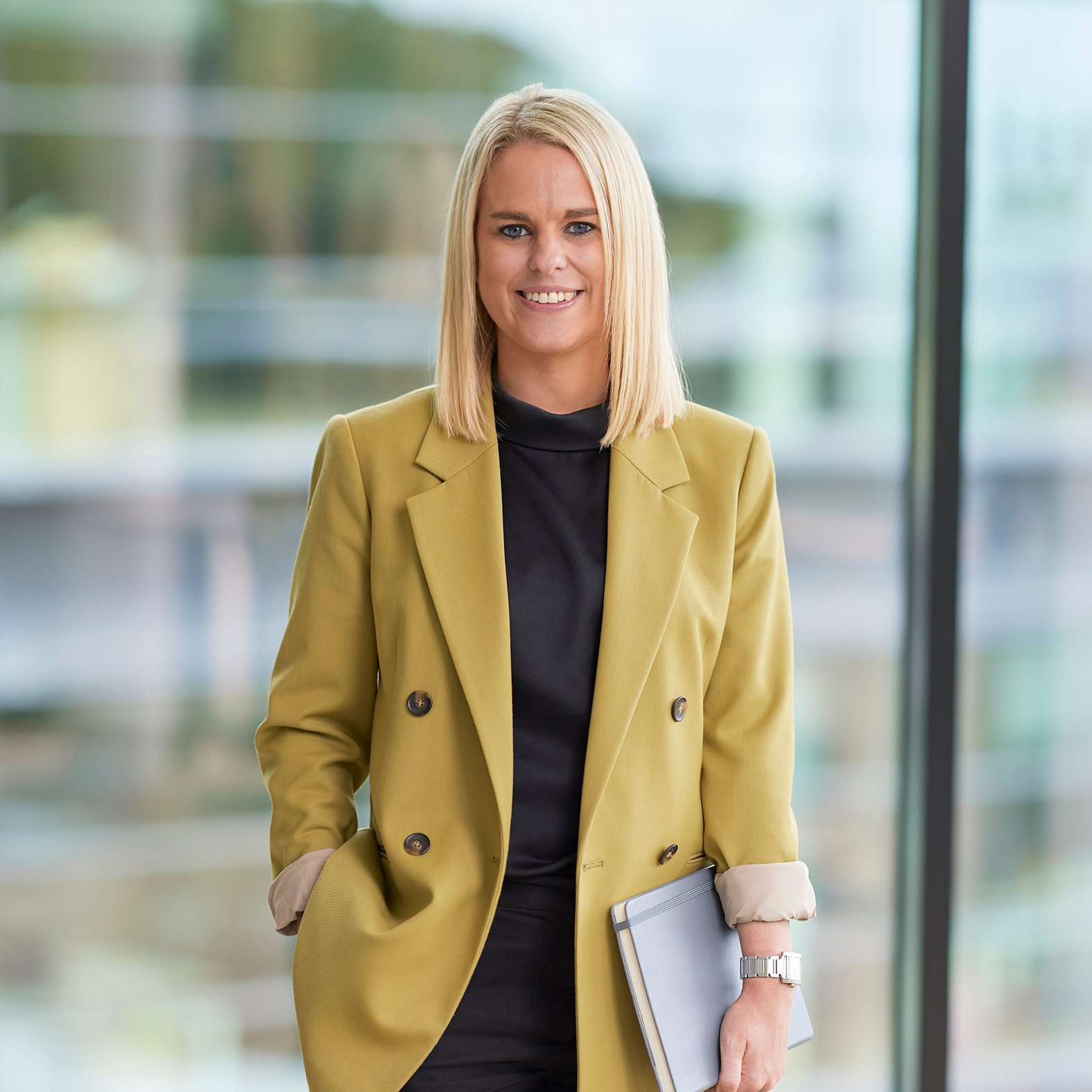Key points
- Author Tim Marshall says space is the new arena for rivalry over resources and military advantage
- He tells portfolio director Claire Shaw why we need new laws to head off future clashes over territorial and other claims
- But ‘Space race 2.0’ also promises many benefits to our existence back on earth

As with any investment, your capital is at risk.
Great power rivalries are no longer confined to Earth, according to the author Tim Marshall. Portfolio director Claire Shaw asks the author what’s at stake in the new age of ‘astropolitics’.
Claire Shaw: Your latest book, The Future of Geography, contends that the laws governing space are not fit for purpose. Why?
Tim Marshall: They were written in the 1960s and reflect that era. The drafters couldn’t foresee the technological leaps made since. The Outer Space Treaty [1967] needs drastic rewriting to reflect the realities of today and tomorrow. For example, it forbade weapons of mass destruction in space, meaning nuclear weapons, but said nothing about laser weaponry – it didn’t exist then.
The idea that no state or company can own any part of space is outdated. Given that we’re already going to space as nation-states and companies, we need legal language to reflect that.
CS: How has the balance between the big space powers shifted over the last 20 years?
TM: In the last century, there were only two: the US and the Soviet Union, later Russia. In this century, it’s those two plus China. Now, Russia is dropping below the others because its space budget is going more towards the Ukraine war.
What was once state-led in the US and China now involves private companies. SpaceX is the prime example. In China, although the state dominates, there are a lot of small commercial space companies. I suspect that China and the US will put more distance between themselves and Russia.
CS: Will the second Trump presidency change anything?
TM: It was Trump in 2019 who listened to advisers and founded the US Space Force. Its budget has increased year-on-year. There is no big expectation that he’ll cut the military budget. The nexus of state and private enterprise is strong in the US.
Commercial companies’ subsidies would be cut before Space Force. American politicians understand space and its place in critical national infrastructure, the economy and military in a way that Europeans don’t.
CS: How important is it to go to the moon?
TM: In many industries, there’s a debate about the advantages of being first: whether it’s better to let others make mistakes and then leapfrog them. Not when it comes to finding new resources on the moon, which is why there’s a race to get there.
Previously, there was no reason to go back: we’d been lots of times and collected lots of rocks.
Now, 50 years on, you’ve got the rationale of using the moon as a lily pad to hop to Mars. Then you’ve got the commercial aspect of finding and potentially extracting minerals. You can’t not be there because if it does then turn out to be a Klondike of valuable minerals, you’re stuffed.
The lunar south pole is where the action is. It’s a hard landscape with proper mountains, caves and craters. It has interesting geography, and there’s ice there in parts that don’t get any sunshine.
They’ve proven there are minerals there that are needed for the 21st century. They’re less sure about the amount, but with water and minerals, that’s the place to be, though it’s hard territory to land in and build a base on.
Then there’s the military aspect. If you’ve got a moon base and satellites around it that give you a full spectrum view of what’s going on there, as well as on Earth, you’re in a better position to protect your assets.
CS: What minerals would you highlight?
TM: The one that they’d like to find a massive seam of is lithium, which has multiple uses in energy storage and materials science. Also, there are large quantities of helium-3 in the soil, though how useful that is, we still don’t know.
Chinese scientists believe there is enough of it to fuel all of Earth’s power needs for 10,000 years. That’s the theory, but it depends on finding it, getting it, processing it, bringing it back – and cracking nuclear fusion.

Tim Marshall is a former diplomatic editor of Sky News and has reported from 40 countries. His bestselling books on geopolitics include Prisoners of Geography, The Power of Geography and Divided: Why We’re Living in an Age of Walls
CS: How have SpaceX’s reusable rockets and Starlink’s satellite constellations affected the balance of power?
TM: Elon Musk divides opinion. But whatever you think of the founder of those companies, he’s a revolutionary innovator in this industry.
Reusable rockets mean instead of chucking away tens of millions of dollars every time, you bring the rocket back. The knock-on effect is that not only is it cheaper to launch, it’s also cheaper to carry something on the payload.
That has democratised access to space. Before, many lesser powers – Nigeria, say – would find it hard to cover the costs of launching a major satellite constellation. Now, they make CubeSats, satellites the size of a Rubik’s cube.
You can build 20 of them and stick them in the nose cone of a SpaceX rocket, along with those of several other companies or countries.
The cost of the satellites has come down because they can make them so small now, and then the cost of getting them up there and launching them has come down because of reusable rockets. That’s revolutionary. Having said that, there is also a first-come-first-served aspect to space. There are parts where, if you don’t get there in the initial wave, you may never get there.
In the 1960s, there were a handful of countries in space. There are now more than 80. Part of that is down to Musk. He’s been at the forefront of delivering the internet via satellite. Because of that, the Russia-Ukraine war is the first real space war in which both sides have used space assets.
SpaceX is a massive part of why space is becoming interesting again. Musk has gripped people’s imaginations. Anyone who’s seen two of its rockets landing at the same time… it looks like sci-fi. Catching a rocket with those ‘chopstick’ arms is sensational.
CS: We like companies with technologically minded leaders like Musk, Meta’s Mark Zuckerberg or Shopify’s Tobi Lütke. They’re not interested in winning last decade’s technology…
TM: Yes, because you mustn’t make the old military mistake of fighting the last war. Otherwise, it will be like the Azerbaijan-Armenia War of 2020 when Armenia, which hadn’t been keeping up, had its tanks and armoured personnel carriers at the front line. The Azerbaijanis, using Turkish-made drones, also AI, virtually wiped them out in two days.
CS: What role could space play in monitoring climate change?
TM: That’s one of the many positive aspects of Space Race 2.0. We’ve already deflected a small asteroid off its course two million miles away. That was good forward planning in case a much bigger one comes our way.
We use satellites to measure the temperature of the oceans to better understand climate change. We’re working on how to get solar power from space, where there’s very powerful 24/7 sunlight, and it can be directed wherever you want to.
We are doing amazing medical experiments in space. We use satellites to tell farmers where to plant crops, where’s best to build transport infrastructure at the lowest cost.
Rockets do use huge amounts of fuel, but it’s minuscule relative to what comes out of cars every day.
And we have the prospect of cheap, clean solar energy, the metals that we need to build our renewable technology down here: we’re not going to find those solutions if we don’t go into space. So, on balance, we have to go.
And we will. Because humankind has never seen a mountain it didn’t want to conquer.
CS: What will be the big space development in the next 30 to 40 years?
TM: Answering that means imagining the unimaginable. If 200 years ago you’d told people there were things in the air called radio waves, and if you shouted into one, someone could hear you 10,000 miles away, they’d say you were mad. So it will be something similar we haven’t thought of yet.
Things that are completely sci-fi now will be completely part of our everyday lives. Remember Captain Kirk’s flip-phone communicator in Star Trek? That one went from fantasy to reality quite quickly.

Claire Shaw is portfolio director of Scottish Mortgage Investment Trust. Before joining Baillie Gifford, she was a portfolio manager specialising in Europe.
Important information
Baillie Gifford & Co and Baillie Gifford & Co Limited are authorised and regulated by the Financial Conduct Authority (FCA). Baillie Gifford & Co Limited is an Authorised Corporate Director of OEICs.
Baillie Gifford Overseas Limited provides investment management and advisory services to non-UK Professional/Institutional clients only. Baillie Gifford Overseas Limited is wholly owned by Baillie Gifford & Co. Baillie Gifford & Co and Baillie Gifford Overseas Limited are authorised and regulated by the FCA in the UK.
Persons resident or domiciled outside the UK should consult with their professional advisers as to whether they require any governmental or other consents in order to enable them to invest, and with their tax advisers for advice relevant to their own particular circumstances.
Financial intermediaries
This communication is suitable for use of financial intermediaries. Financial intermediaries are solely responsible for any further distribution and Baillie Gifford takes no responsibility for the reliance on this document by any other person who did not receive this document directly from Baillie Gifford.
Europe
Baillie Gifford Investment Management (Europe) Ltd (BGE) is authorised by the Central Bank of Ireland as an AIFM under the AIFM Regulations and as a UCITS management company under the UCITS Regulation. BGE also has regulatory permissions to perform Individual Portfolio Management activities. BGE provides investment management and advisory services to European (excluding UK) segregated clients. BGE has been appointed as UCITS management company to the following UCITS umbrella company; Baillie Gifford Worldwide Funds plc. BGE is a wholly owned subsidiary of Baillie Gifford Overseas Limited, which is wholly owned by Baillie Gifford & Co. Baillie Gifford Overseas Limited and Baillie Gifford & Co are authorised and regulated in the UK by the Financial Conduct Authority.
China
Baillie Gifford Investment Management (Shanghai) Limited
柏基投资管理(上海)有限公司(‘BGIMS’) is wholly owned by Baillie Gifford Overseas Limited and may provide investment research to the Baillie Gifford Group pursuant to applicable laws. BGIMS is incorporated in Shanghai in the People’s Republic of China (‘PRC’) as a wholly foreign-owned limited liability company with a unified social credit code of 91310000MA1FL6KQ30. BGIMS is a registered Private Fund Manager with the Asset Management Association of China (‘AMAC’) and manages private security investment fund in the PRC, with a registration code of P1071226.
Baillie Gifford Overseas Investment Fund Management (Shanghai) Limited
柏基海外投资基金管理(上海)有限公司 (‘BGQS’) is a wholly owned subsidiary of BGIMS incorporated in Shanghai as a limited liability company with its unified social credit code of 91310000MA1FL7JFXQ. BGQS is a registered Private Fund Manager with AMAC with a registration code of P1071708. BGQS has been approved by Shanghai Municipal Financial Regulatory Bureau for the Qualified Domestic Limited Partners (QDLP) Pilot Program, under which it may raise funds from PRC investors for making overseas investments.
Hong Kong
Baillie Gifford Asia (Hong Kong) Limited
柏基亞洲(香港)有限公司 is wholly owned by Baillie Gifford Overseas Limited and holds a Type 1 license from the Securities & Futures Commission of Hong Kong to market and distribute Baillie Gifford’s range of collective investment schemes to professional investors in Hong Kong. Baillie Gifford Asia (Hong Kong) Limited
柏基亞洲(香港)有限公司 can be contacted at Suites 2713-2715, Two International Finance Centre, 8 Finance Street, Central, Hong Kong. Telephone +852 3756 5700.
South Korea
Baillie Gifford Overseas Limited is licensed with the Financial Services Commission in South Korea as a cross border Discretionary Investment Manager and Non-discretionary Investment Adviser.
Japan
Mitsubishi UFJ Baillie Gifford Asset Management Limited (‘MUBGAM’) is a joint venture company between Mitsubishi UFJ Trust & Banking Corporation and Baillie Gifford Overseas Limited. MUBGAM is authorised and regulated by the Financial Conduct Authority.
Australia
Baillie Gifford Overseas Limited (ARBN 118 567 178) is registered as a foreign company under the Corporations Act 2001 (Cth) and holds Foreign Australian Financial Services Licence No 528911. This material is provided to you on the basis that you are a “wholesale client” within the meaning of section 761G of the Corporations Act 2001 (Cth) (“Corporations Act”). Please advise Baillie Gifford Overseas Limited immediately if you are not a wholesale client. In no circumstances may this material be made available to a “retail client” within the meaning of section 761G of the Corporations Act.
This material contains general information only. It does not take into account any person’s objectives, financial situation or needs.
South Africa
Baillie Gifford Overseas Limited is registered as a Foreign Financial Services Provider with the Financial Sector Conduct Authority in South Africa.
North America
Baillie Gifford International LLC is wholly owned by Baillie Gifford Overseas Limited; it was formed in Delaware in 2005 and is registered with the SEC. It is the legal entity through which Baillie Gifford Overseas Limited provides client service and marketing functions in North America. Baillie Gifford Overseas Limited is registered with the SEC in the United States of America.
The Manager is not resident in Canada, its head office and principal place of business is in Edinburgh, Scotland. Baillie Gifford Overseas Limited is regulated in Canada as a portfolio manager and exempt market dealer with the Ontario Securities Commission (‘OSC’). Its portfolio manager licence is currently passported into Alberta, Quebec, Saskatchewan, Manitoba and Newfoundland & Labrador whereas the exempt market dealer licence is passported across all Canadian provinces and territories. Baillie Gifford International LLC is regulated by the OSC as an exempt market and its licence is passported across all Canadian provinces and territories. Baillie Gifford Investment Management (Europe) Limited (‘BGE’) relies on the International Investment Fund Manager Exemption in the provinces of Ontario and Quebec.
Israel
Baillie Gifford Overseas Limited is not licensed under Israel’s Regulation of Investment Advising, Investment Marketing and Portfolio Management Law, 5755–1995 (the Advice Law) and does not carry insurance pursuant to the Advice Law. This material is only intended for those categories of Israeli residents who are qualified clients listed on the First Addendum to the Advice Law.
Singapore
Baillie Gifford Asia (Singapore) Private Limited is wholly owned by Baillie Gifford Overseas Limited and is regulated by the Monetary Authority of Singapore as a holder of a capital markets services licence to conduct fund management activities for institutional investors and accredited investors in Singapore. Baillie Gifford Overseas Limited, as a foreign related corporation of Baillie Gifford Asia(Singapore) Private Limited, has entered into a cross-border business arrangement with Baillie Gifford Asia (Singapore) Private Limited, and shall be relying upon the exemption under regulation 4 of the Securities and Futures (Exemption for Cross-Border Arrangements) (Foreign Related Corporations) Regulations 2021 which enables both Baillie Gifford Overseas Limited and Baillie Gifford Asia (Singapore) Private Limited to market the full range of segregated mandate services to institutional investors and accredited investors in Singapore.
142702 10053696
